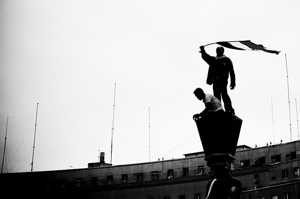Dispatches From Cairo: Sand and Political Excitement Fill the Air as Election Nears
One month before Egypt's presidential vote, 100,000 or more Islamists and liberals of all parties packed Tahrir Square to join in support of Egypt's revolution.
We asked Lauren Unger-Geoffroy, an international artist who lives in Cairo, to share her perspective of life in Egypt after the revolution. In this entry, she writes about that nation’s approaching presidential election and the travails of the candidates.
CAIRO — On Friday, 100,000 or more Egyptians packed Tahrir Square in an impressive demonstration of popular mobilization. The event was a moment of awkward reunion between bearded Islamists and liberals of all parties in which unified slogans, generally calling for continued backing of the revolution, were on display. Political rivals found comfort in a full-contact mash of humanity as they joined in support of the new Egypt.
There were eight stages for the 40 or so parties and political movements that were represented. Groups marched in from all over Cairo, and there even was one, forming “the Revolutionary March,” that came from Suez, more than 70 miles away.
Friday’s demonstration was a pause and an attempt to re-coalesce the people’s increasingly diverging motives. Protests, but not campaigning, are permitted in the presidential contest, and there’s a thin line between the two.
Most of the people at protests in Tahrir over the past few weeks had been Salafi supporters of Hazem Abu-Ismail, a famous TV imam who recently was disqualified as a candidate in the presidential election, in which he ran as a hard-line Islamist and an anti-West candidate.
Ironically, the ultraconservative was forced out of the race when it was reported that his late mother had held U.S. citizenship. Abou-Ismail, who denied that his mother had been an American, ran afoul of a regulation that his own Salafist party had put through. That rule says the parents or spouse of a presidential candidate must have held only Egyptian citizenship.
The chorus of a song played last week at a rally for Abu-Ismail in Tahrir went: “We will make from our skulls a stairway for your dignity.”
Earlier, the emergence of another would-be presidential candidate, Omar Suleiman, had threatened to trigger a public uprising. The former head of Egyptian intelligence, chief enforcer and vice president during the last days of Hosni Mubarak’s reign registered his candidacy just before the deadline. Seemingly those who want a return to the last regime are not few; after only two days of collecting signatures, Suleiman submitted the required 30,000. However, he was disqualified on the grounds that many of those signatures were invalid and therefore the total was insufficient. Undoubtedly, a run by Suleiman would have touched off major riots and other violence.
One of my acquaintances — a privileged architect who had told me that when he was young he played in a rock band with country club comrades who would later become some of Mubarak’s infamous billionaire associates — asked me: “Why do people think Suleiman is bad?” When I mentioned torture, spying, arresting, kidnapping and making people disappear, he replied, “That doesn’t make him bad.”
That’s an opinion shared by some other Egyptians, but the rest of the country cried out in outrage against the candidacy and made it obvious that bloodshed would return if the ruling military allowed Mubarak’s spymaster to run. Egypt will not again passively accept being held hostage.
Khairat al-Shater, the Muslim Brotherhood’s disqualified candidate, is a business genius who spent more than 12 years, in three stints, as a political prisoner under Mubarak, and even as a captive continued to generate hugely successful businesses faster than they could be confiscated. He is a major figure of the Muslim Brotherhood. His incarceration for political opposition — more high irony here — was the source of his disqualification for candidacy. Egypt would have been lucky to have him in charge of commerce and development.
Others who were eliminated, for various reasons, were less important candidates without strong support. Among them were Ahmed Shafiq, Mubarak’s last prime minister, and Ayman Nour of the Tomorrow of the Revolution party.The latest public survey statistics, taken this month before the eliminations, showed 28 percent of Egyptians supporting the disqualified Salafist Abu-Ismail and 39 percent backing the last major candidate standing, Amr Moussa.
Moussa has been a front-runner since the early days of the revolution and was the people’s favorite to replace Mubarak at that time. His good track record as a onetime secretary-general of the Arab League, an ambassador and a foreign minister make him a reassuring choice. In agreement with all the other candidates in their criticism of Israel, Moussa has said that the controversial 1978 Camp David peace treaty between Egypt and Israel is not sacred. Attempts to discredit Moussa through website reports that Moussa’s half brother is the son of a Jewish woman failed when the assertions were shown to be false.
There is one remaining significant Islamist candidate, Abdel Moneim Aboul Fotouh, but he does not have a comparable following. The rest of the vote in the public survey was split among more than 15 others who at that point had survived as registered candidates.
The presidential election will take place May 23 and 24. In the span of a few weeks, hundreds of proposed candidates were narrowed down first by requiring 30,000 specifically distributed voters’ signatures, the backing of 30 members of the Parliament or the endorsement of a represented party. This allowed only about two dozen to apply for registration. Though most of the rejections were appealed in the allotted two days, the appeals have failed, and the rejected applicants seem to be definitively out. The final candidates will be announced next Thursday, only three weeks before the election. However, until May 22 a committee will accept objections that might exclude candidates.
The differences between the concurrent presidential campaigns of Egypt and the United States are so vast that they almost defy comparison. On the one hand, there’s the USA dragging its big bully of a body, bulging unhealthily under a corrupt, capitalist, bipartisan system, through multimillion-dollar lobby-funded ad onslaughts, primaries and other costly campaign stages toward its far-off November election media fantasia. On the other, there’s Egypt scurrying and choosing quickly among a jumble of aspirants. Critics of Egypt’s embryonic electoral approach may have some valid complaints, but the nation’s post-revolutionary system has some virtues that will be appreciated by many campaign-weary Americans.
Despite the springtime sand-haze now obscuring Cairo, activists plan to continue coming out in numbers on Fridays, in protests and displays of solidarity, to show they are not to be ignored again.
The stumbling new democracy of Egypt appears for the moment, barring another wave of confrontation knocking it off its feet, and despite the continuing menace of foreign influence, to be en route to a plateau where it can catch its breath, Insha’Allah.
The view of Cairo since Wednesday has been through a fog of blowing dust. Under that veil, the calls to prayer have been muted and voices have been muffled on the street, which remain busy even though some residents are staying indoors. Many of those who ventured out in the hamseen, or sandstorm, wrap their faces in scarves and wear glasses or goggles. Inside, behind windows, the light is filtered through a golden mist as I write this. Beautiful, though the particles penetrate everywhere, blowing in through cracks, covering everything with dust.
There will be many speeches in the forum of Tahrir as the election approaches, but we hope there will not be violence. Today the air is full of the stinging, ancient Egyptian sand that makes people wrap their scarves around themselves in ways that obscure their differences.
Your support matters…Independent journalism is under threat and overshadowed by heavily funded mainstream media.
You can help level the playing field. Become a member.
Your tax-deductible contribution keeps us digging beneath the headlines to give you thought-provoking, investigative reporting and analysis that unearths what's really happening- without compromise.
Give today to support our courageous, independent journalists.






You need to be a supporter to comment.
There are currently no responses to this article.
Be the first to respond.